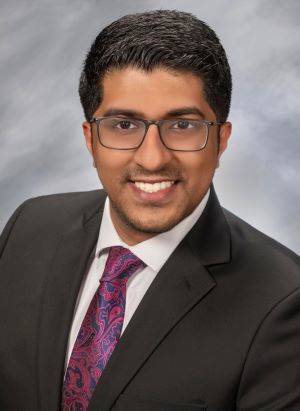 George Vilanilam, M.D., was recently named ACR’s 2023-2024 Informatics Fellow. The Informatics Fellowship provides radiology residents and early-career professionals with hands-on experience in the field of informatics, including one-on-one mentoring and informatics projects. The fellows are introduced to the Data Science Institute®, ACR AI-LAB™, and other ACR Informatics projects.
George Vilanilam, M.D., was recently named ACR’s 2023-2024 Informatics Fellow. The Informatics Fellowship provides radiology residents and early-career professionals with hands-on experience in the field of informatics, including one-on-one mentoring and informatics projects. The fellows are introduced to the Data Science Institute®, ACR AI-LAB™, and other ACR Informatics projects.
Learn moreabout George in our Q&A below (answers have been edited for brevity):
Can you tell us a bit about yourself?
I am a fourth-year radiology resident at the University of Arkansas for Medical Sciences and earned my medical degree from the Christian Medical College & Hospital in India. After graduation, I had the opportunity to participate in clinical and translational research at the Mayo Clinic in Florida as a post-doctoral fellow before stepping into a diagnostic radiology residency.
After completing my residency, I will be pursuing fellowships in Neuroradiology and Neuroendovascular surgery at the University of Texas Southwestern Medical Center in Dallas. My goal is to grow as an academic diagnostic and interventional neuroradiologist and to establish and lead an informatics division.
What about informatics interests you?
Informatics profoundly interests me due to its unique intersection between healthcare and technology. The digital revolution in medicine has highlighted the need for professionals who can navigate both the clinical and IT worlds. The evolution of roles from pure computer programmers and clinical professionals to PACS administrators and, ultimately, to Imaging Informatics professionals, showcases the growing demand for individuals who understand not only the intricacies of clinical workflow, but also the complexities of information technology.
Being able to bridge these two domains not only facilitates improved patient care but also offers an opportunity to innovate within radiology. The continual advancements and widening application of informatics across various medical specialties present both a challenge and an opportunity to broaden my knowledge and skills, further intensifying my interest in this area.
What are you most excited for in this fellowship program?
I am particularly interested in the practical learning experiences that this fellowship program offers. The hands-on exposure to the field of informatics, coupled with individualized mentoring and the opportunity to undertake dedicated informatics projects, promises a dynamic and immersive learning journey.
This fellowship program also represents a unique and invaluable chance to gain practical experience and to collaborate with leaders within radiology informatics. I am excited about acquiring skills that will prepare me to lead advancements in the realm of radiology AI and informatics.
Ultimately, this fellowship will serve as a significant steppingstone towards my goal of creating and leading a Radiology Informatics division in the future. The skills and knowledge I gain will not only enhance my capacity to provide better patient care but also equip me to obtain a CIIP certification.
What areas of research are you interested in?
I’m interested in the intersection of workflow efficiency and quality improvement within radiology, primarily the optimization of reporting times for emergent studies ordered within the emergency department. I am currently part of a team that is working towards reducing the overall turnaround time, ensuring quicker and more efficient patient care.
I am also looking to harness the power of data to improve the functionality of our PACS system. By mining for specific keywords, I believe we can enhance the searchability of our system, ultimately improving patient care through quality improvement, and facilitate research and education.
Another area that I am particularly drawn to involves structured reporting in neuroradiology, with a focus on the consistent monitoring of lesions. I am confident that this can reduce errors, promote clear communication, and improve patient outcomes.